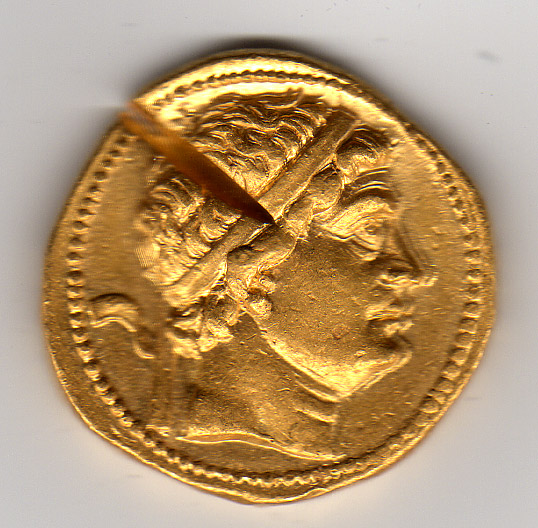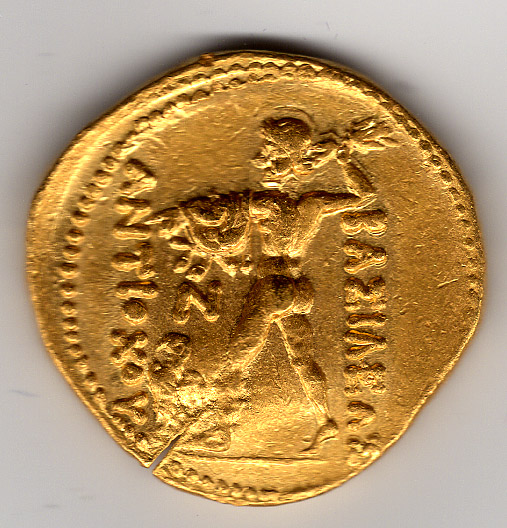

Lot description:
MONNAIES GRECQUES
Greek Coins
Bactria: Diodotos II
in the name of Antiochos II
Gold stater, c. 235-230 BCE
Weight:8.38 gm., Diam:19 mm., EF to FDC with test cut, Die axis:6h, Certificate of authenticity by CNG Coins.
VALUE $4000 - 3200 euros
Bust of Diodotos facing right/
Zeus standing left, hurling thunderbolt
Greek legend: BAΣIΛEΩΣ ANTIOXOY (of King Antiochos)
This coin marks the emergence of the Bactrian kingdom. Diodotos, who was probably the Seleucid king Antiochos II's governor in Bactria, declared his independence by placing his own bust on the coins.
GREEK KINGS of BAKTRIA. Diodotos II. Circa 235-230/225 BC. AV Stater (8.38 gm). Attic standard. Mint A (near Aï Khanoum).
Estimate $4000 - 3200 euros
GREEK KINGS of BAKTRIA. Diodotos II. Circa 235-230/225 BC. AV Stater (8.38 gm). Attic standard. Mint A (near Aï Khanoum). Diademed head of Diodotos I right / Zeus advancing left, holding thunderbolt and aegis, eagle at his feet; wreath in left field. Holt Series D, Group 7; Bopearachchi -; SNG ANS 82; MIG -. , test cut on head. ($4000)
All of the staters in the name of Diodotos are struck during the reign of Diodotos II. Although a few appear with the portrait of Diodotos I, these are all posthumous.
Une copie de la facture de CNG COINS sera donné à l'acheteur.


After death of last great Mauryan King, Ashoka, India was disintegrated into many small kingdoms, which provided great opportunity for Indo-Greek kings for eastern expansion of their kingdoms. Seleucid monarch, Antiochus III (223-187 BC) carried out the third Greek (first Greek invasion is considered to be by Alexander while second is by Seleucus) invasion of India in 206 BC. The first stop was the Kabul valley in Afghanistan, then ruled by Mauryan governor, Subhagsena or Subhashsena ( Sophagasenus according to Greek historians). Interestingly, the invasion did not escalate into a expected massive bloodshed but resulted into exchange of gifts and Antiochus withdrew from India. Subhagsena is listed in names of Mauryan princes and also Yadava dynasty as descendants of Pradyumana. Most Probably, he was a prince of ancient Vrishni vansha (claims descent from lord Krishna) and also related to Mauruyan dynasty. Possibly he was a grandson of Ashoka or Ashoka's son Kunala. Initially, he ruled as governor of Kabul valley from 206 BC but soon assumed independance on Shunga coup in 185 BC. After withdrawal of Antiochus from India, Euthydemos consolidated his realm in Bactria by re-oraganizing the currency and mints. Euthydemos died in 190 BC and succeded by his son Demetrius. Demetrius (190-171 BC) was the first Indo-Greek ruler who successfully brought most of the Afganistan, Punjab and Sindh under his control. He defeated Subhagsena, now king of Kabul and proudely took a title `King of Indians'. The descendants of Subhagsena did not die out but went on to found state of zabul (or Gujni in Afghansistan) before retreating back to Indus/Punjab and are current Bhatti rulers of Jaisalmer princely state (modern Rajasthan).